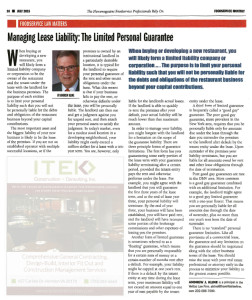Veritas in the Washington Post on Lawsuit against President Trump
Scott Rome quoted in a Washington Post story on the Unfair Competition lawsuit against President Trump and the Trump Organization businesses.
Scott Rome quoted in a Washington Post story on the Unfair Competition lawsuit against President Trump and the Trump Organization businesses.
Scott Rome interviewed on Law.com/The National Law Journal regarding accomplishing service of process on the President of the United States.
Scott Rome quoted in the Washington Post on the specifics of the District of Columbia Human Rights Act and the ability of hospitality establishments to deny service to White Nationalists/Alt-Right.
Scott Rome quoted extensively in the Washingtonian, regarding the ability of hospitality establishments to deny service to White Nationalists/Alt-Right, and the perils facing restaurants during the 2017 inauguration period.
Scott Rome quoted in the Bethesda Beat on the victory by Veritas on behalf of an independent franchisee of a 7-11 franchise, and its right to sell alcohol.
Andrew J. Kline quoted in the Washington Business Journal on the options of establishments that are subject to threats emanating from fake news.
The most recent Veritas article, as published in Foodservice Monthly

When buying or developing a new restaurant, you will likely form a limited liability company or corporation to be the owner of the restaurant and the tenant under the lease with the landlord for the business premises. The purpose of such entities is to limit your personal liability such that you will not be personally liable for the debts and obligations of the restaurant business beyond your capital contributions.
The most important asset and the biggest liability of your new business is likely to be the lease of the premises. If you are not an established operator with multiple successful locations, or if the premises is owned by an institutional landlord in a particularly desirable location, it is typical for the landlord to require your personal guarantee of the rent and other tenant obligations under the lease. What this means is that if your business fails to pay the rent, or otherwise defaults under the lease, you will be personally liable. The landlord can then sue and get a judgment against you for unpaid rent, and then attach your personal assets to satisfy the judgment. In today’s market, even for a modest sized location in a developing neighborhood, your liability might easily exceed a million dollars for a lease with a ten year term. You are, however, only liable for the landlord’s actual losses. If the landlord is able to quickly re-rent the premises after your default, your actual liability will be much lower than that maximum amount.
In order to manage your liability, you might bargain with the landlord for a limitation on the scope of the guarantee liability. There are three principle forms of guarantee limitations. The first form has you guaranteeing some early portion of the lease term with your guarantee liability terminating after a certain period, provided the tenant entity pays the rent and otherwise performs under the lease. For example, you might agree with the landlord that you will guarantee the first three years of the lease term, and at the end of lease year three, your personal liability will terminate. By the end of year three, your business will have been established, you will have paid rent, and the landlord will have recouped some portion of the brokerage commissions and other expenses of leasing you the premises.
Another form of limited guarantee is sometimes referred to as a “floating” guarantee, which means that you are personally responsible for a certain sum of money or a certain number of months rent after a default. For example, your liability might be capped at one year’s rent. If there is a default by the tenant entity at any time during the lease term, your maximum liability will not exceed an amount equal to one year of rent payable by the tenant entity under the lease.
A third form of limited guarantee is frequently called a “good guy” guarantee. The pure good guy guarantee, more prevalent in the New York area, requires that you be personally liable only for amounts due under the lease through the date you surrender the premises to the landlord after default by the tenant entity under the lease. Upon surrender of the premises your liability terminates, but you are liable for all amounts owed for rent and other lease obligations through the date of termination.
Pure good guy guarantees are rare in the DMV area. More common is a good guy guarantee combined with an additional limitation. For example, the landlord might agree to a good guy limited guarantee with a one year floater. That means you are personally liable for all amounts due through the date of surrender, plus no more than one year’s rent from the date of surrender.
There is no “standard” personal guarantee limitation. Like all provisions of a commercial lease, the guarantee and any limitation on the guarantee should be negotiated along with the other business terms of the lease. You should raise the issue with your real estate professional or attorney early in the process to minimize your liability to the greatest extent possible.

1225 19th Street, NW
Suite 320
Washington, DC 20036
Office: 202.686.7600
info@theveritaslawfirm.com
